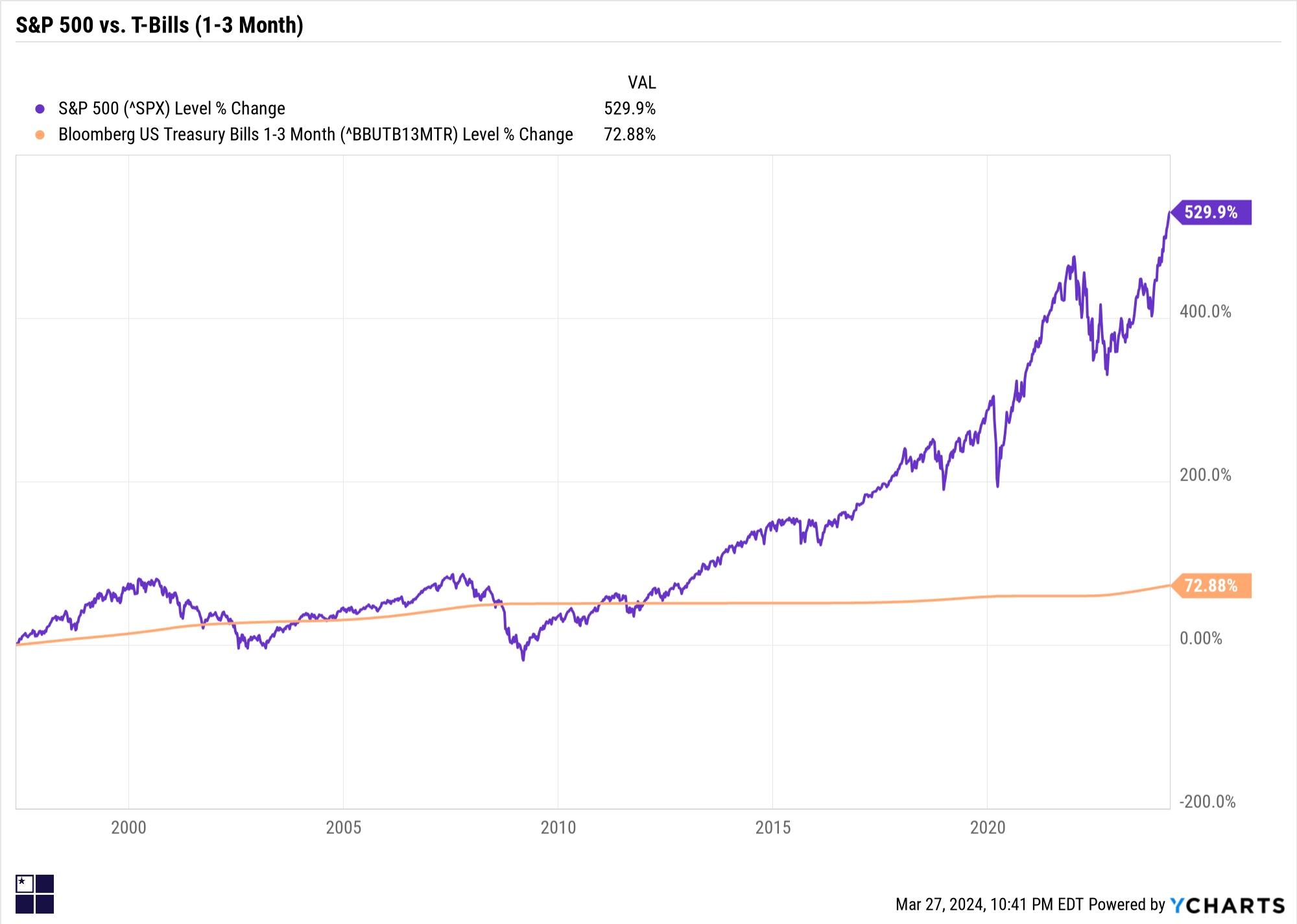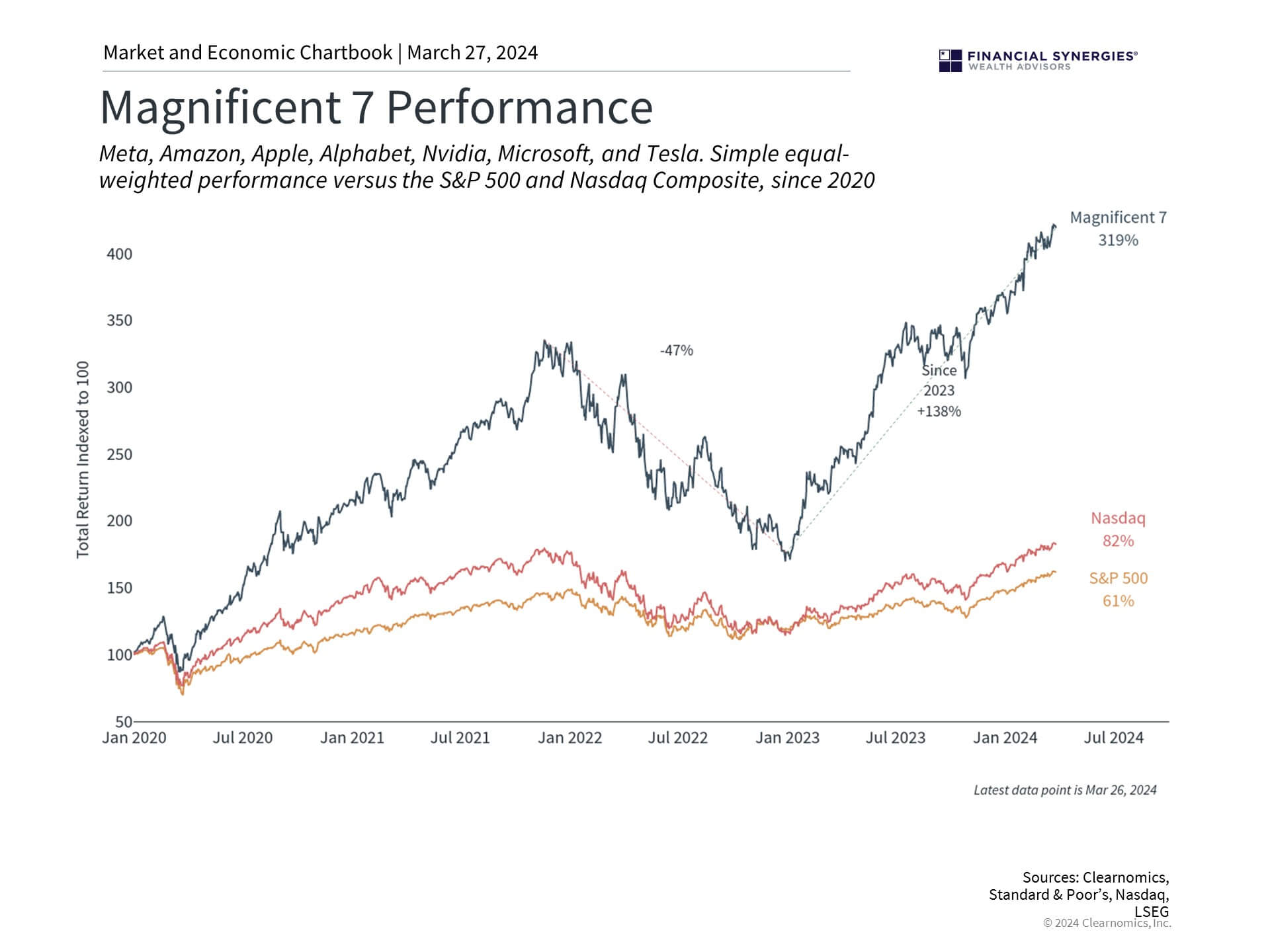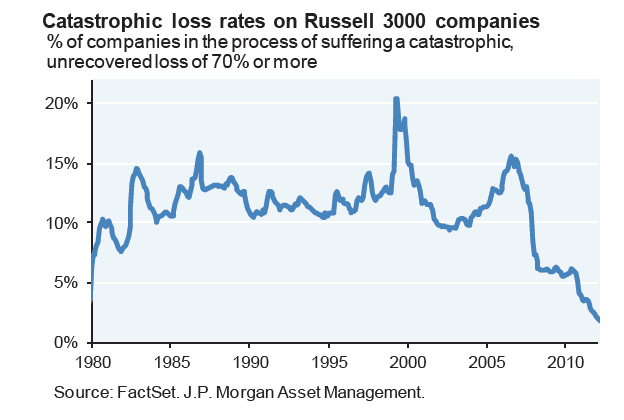This might sound a little strange coming from someone who invests other people’s money in the stock market, but it’s true – Most Stocks Are Bad Investments.
It’s almost impossible to beat broadly diversified equity funds by picking individual stocks for any sort of sustained period of time. You might get lucky for a year or two; maybe even five. But that doesn’t mean you’ll end up the next Warren Buffett.
Hell, even Warren Buffett’s Berkshire Hathaway has underperformed the S&P 500 for the last twenty years!*
So, does this mean we should not invest in stocks? Absolutely not. It just means “how” you invest in stocks is critical, and must be carefully managed.
Investing in Individual Stocks Might not be Your Best Bet
The allure of striking gold in the stock market by picking the next big winner like Amazon or Tesla captivates many investors. Yet, the harsh reality is that such success stories are rare exceptions in a vast sea of underperforming stocks. A deeper dive into the data reveals a global market phenomenon where the majority of stocks fail to outpace even the most conservative investment benchmarks, such as U.S. Treasury bills. You read that right… T-Bills!
Does this mean that T-Bills are a better long-term investment than stocks? Not even close – not if we’re talking about the stock “market.” The stock “market” has absolutely trounced T-Bills and most other fixed income investments over the long-term.

But the reality is: most individual stocks underperform the broad stock market, making them risky and, often, poor investment choices for the average investor.
Now, my apologies, but I’m going to throw some data at you below…
The Hard Truth About Stock Investing
Research spanning nearly a century of stock market history has unveiled a harsh reality: a significant majority of stocks fail to outperform low-risk, low-yield investments such as Treasury Bills. This is not merely an abstract statistic but a reflection of a market where success is disproportionately driven by a small fraction of companies.
For instance, from 1990 to 2020, while the U.S. stock market generated over $75 trillion in wealth, the lion’s share of this growth came from a minuscule segment of firms. In fact, the majority (55.2%) of stocks resulted in decreased shareholder wealth compared to a Treasury Bill benchmark.
The skewness of stock market returns is even more pronounced when examining the sources of wealth creation.
Astonishingly, only the top-performing 2.4% of companies are responsible for all of the $75.7 trillion in net global stock market wealth generated over the same thirty-year period (1990-2020) cited above!
Outside the U.S., the figure is even more staggering, with a mere 1.41% of firms accounting for $30.7 trillion in net wealth creation. This data underscores the extreme concentration of successful investments and the monumental challenge faced by investors attempting to identify the next market leader.
Because the stock market is positively skewed, a few high performers drive the majority of gains. This skewness implies that randomly selected portfolios of individual stocks are more likely to underperform the market average.

For example, technology giants like The Magnificent 7 account for a significant portion of the overall market’s wealth creation, overshadowing thousands of other publicly traded companies that either lose value over time or deliver minimal returns.
Think it’s easy having the foresight to just select Magnificent 7 – like stocks and watch them outperform? Think again. Get the timing wrong on buying one of these high-flyers and you’ll get crushed.
This data challenges the conventional wisdom of individual stock investing and highlights the difficulty of picking winners in a landscape dominated by underperformers. In other words, in most cases, a concentrated stock holder would have been better off invested more broadly across the market.
The Volatility and Risk of Concentrated Investments
Delving deeper into the underperformance of individual stocks, it becomes evident that the issue is compounded by volatility and the risk of permanent loss.
In a J.P. Morgan study using a universe of Russell 3000 companies since 1980, the return on the median stock since its inception vs. an investment in the Russell 3000 Index was -54%.
 And approximately 40% of stocks suffered a permanent decline of more than 70% from their peak values. This was especially pronounced in sectors like Technology, Biotech, and Metals & Mining, where the numbers were even higher.
And approximately 40% of stocks suffered a permanent decline of more than 70% from their peak values. This was especially pronounced in sectors like Technology, Biotech, and Metals & Mining, where the numbers were even higher.
Furthermore, two-thirds of all stocks underperformed the Russell 3000 Index, and for 40% of all stocks, their absolute returns were negative – highlighting the significant risk involved in betting on individual stocks.
The Implications for Diversification
The evidence supporting diversification has never been more compelling. With such a small fraction of companies driving the majority of market returns, the odds of picking individual winners are slim. Instead, investors are better served by embracing broadly diversified strategies, which ensure participation in the upside of these rare outperformers while mitigating the risk of concentrating in underperforming stocks.
Given the global nature of stock underperformance and wealth concentration, geographical diversification also plays a crucial role in a well-rounded investment strategy. The variance in market dynamics and economic conditions across different regions further complicates the stock selection process. By diversifying across global markets, investors can capture growth opportunities worldwide and reduce exposure to region-specific risks.
Conclusion
The path to wealth creation in the stock market does not lie in the elusive pursuit of the next blockbuster stock, but in embracing the collective wisdom of the market through diversified investments. The stark underperformance of individual stocks, coupled with their inherent volatility, makes a compelling case for diversification as the more prudent strategy for long-term investors.
Could you get lucky and pick a winning stock that propels you to heights you never imagined? Yes. But imagine if you bet a significant chunk of your retirement nest egg on a catastrophic loser. Game over – you’d never recover.
The reality is that while individual successes may capture headlines, the broader market provides a more reliable avenue for wealth accumulation. By focusing on broad market exposure, investors can participate in the wealth creation driven by the market’s top performers without exposing themselves to the undue risk of individual stock underperformance.
References:
- “Wealth Creation in the U.S. Public Stock Markets 1926 to 2019,” Hendrik Bessembinder, Department of Finance, W.P. Carey School of Business, Arizona State University.
- “Long-term shareholder returns: Evidence from 64,000 global stocks,”Hendrik Bessembinder
W.P. Carey School of Business, Arizona State University.
- “The Agony and the Ecstasy: The Risks and Rewards of a Concentrated Stock Position,” J.P. Morgan Asset Management.
- *https://www.linkedin.com/pulse/warren-buffett-has-underperformed-sp-500-last-20-years-jain-cfa
Concerns or questions about how your investment portfolio will hold up in the current market environment? Contact Financial Synergies today.
We are a boutique, financial advisory and total wealth management firm with over 35 years helping clients navigate turbulent markets. To learn more about our approach to investment management please reach out to us. One of our seasoned advisors would be happy to help you build a custom financial plan to help ensure you accomplish your financial goals and objectives. Schedule a conversation with us today.
More relevant articles by Financial Synergies:
Most Stocks Are Bad Investments
This might sound a little strange coming from someone who invests other people’s money in the stock market, but it’s true – Most Stocks Are Bad Investments.
It’s almost impossible to beat broadly diversified equity funds by picking individual stocks for any sort of sustained period of time. You might get lucky for a year or two; maybe even five. But that doesn’t mean you’ll end up the next Warren Buffett.
Hell, even Warren Buffett’s Berkshire Hathaway has underperformed the S&P 500 for the last twenty years!*
So, does this mean we should not invest in stocks? Absolutely not. It just means “how” you invest in stocks is critical, and must be carefully managed.
Investing in Individual Stocks Might not be Your Best Bet
The allure of striking gold in the stock market by picking the next big winner like Amazon or Tesla captivates many investors. Yet, the harsh reality is that such success stories are rare exceptions in a vast sea of underperforming stocks. A deeper dive into the data reveals a global market phenomenon where the majority of stocks fail to outpace even the most conservative investment benchmarks, such as U.S. Treasury bills. You read that right… T-Bills!
Does this mean that T-Bills are a better long-term investment than stocks? Not even close – not if we’re talking about the stock “market.” The stock “market” has absolutely trounced T-Bills and most other fixed income investments over the long-term.
But the reality is: most individual stocks underperform the broad stock market, making them risky and, often, poor investment choices for the average investor.
Now, my apologies, but I’m going to throw some data at you below…
The Hard Truth About Stock Investing
Research spanning nearly a century of stock market history has unveiled a harsh reality: a significant majority of stocks fail to outperform low-risk, low-yield investments such as Treasury Bills. This is not merely an abstract statistic but a reflection of a market where success is disproportionately driven by a small fraction of companies.
For instance, from 1990 to 2020, while the U.S. stock market generated over $75 trillion in wealth, the lion’s share of this growth came from a minuscule segment of firms. In fact, the majority (55.2%) of stocks resulted in decreased shareholder wealth compared to a Treasury Bill benchmark.
The skewness of stock market returns is even more pronounced when examining the sources of wealth creation.
Astonishingly, only the top-performing 2.4% of companies are responsible for all of the $75.7 trillion in net global stock market wealth generated over the same thirty-year period (1990-2020) cited above!
Outside the U.S., the figure is even more staggering, with a mere 1.41% of firms accounting for $30.7 trillion in net wealth creation. This data underscores the extreme concentration of successful investments and the monumental challenge faced by investors attempting to identify the next market leader.
Because the stock market is positively skewed, a few high performers drive the majority of gains. This skewness implies that randomly selected portfolios of individual stocks are more likely to underperform the market average.
For example, technology giants like The Magnificent 7 account for a significant portion of the overall market’s wealth creation, overshadowing thousands of other publicly traded companies that either lose value over time or deliver minimal returns.
Think it’s easy having the foresight to just select Magnificent 7 – like stocks and watch them outperform? Think again. Get the timing wrong on buying one of these high-flyers and you’ll get crushed.
This data challenges the conventional wisdom of individual stock investing and highlights the difficulty of picking winners in a landscape dominated by underperformers. In other words, in most cases, a concentrated stock holder would have been better off invested more broadly across the market.
The Volatility and Risk of Concentrated Investments
Delving deeper into the underperformance of individual stocks, it becomes evident that the issue is compounded by volatility and the risk of permanent loss.
In a J.P. Morgan study using a universe of Russell 3000 companies since 1980, the return on the median stock since its inception vs. an investment in the Russell 3000 Index was -54%.
Furthermore, two-thirds of all stocks underperformed the Russell 3000 Index, and for 40% of all stocks, their absolute returns were negative – highlighting the significant risk involved in betting on individual stocks.
The Implications for Diversification
The evidence supporting diversification has never been more compelling. With such a small fraction of companies driving the majority of market returns, the odds of picking individual winners are slim. Instead, investors are better served by embracing broadly diversified strategies, which ensure participation in the upside of these rare outperformers while mitigating the risk of concentrating in underperforming stocks.
Given the global nature of stock underperformance and wealth concentration, geographical diversification also plays a crucial role in a well-rounded investment strategy. The variance in market dynamics and economic conditions across different regions further complicates the stock selection process. By diversifying across global markets, investors can capture growth opportunities worldwide and reduce exposure to region-specific risks.
Conclusion
The path to wealth creation in the stock market does not lie in the elusive pursuit of the next blockbuster stock, but in embracing the collective wisdom of the market through diversified investments. The stark underperformance of individual stocks, coupled with their inherent volatility, makes a compelling case for diversification as the more prudent strategy for long-term investors.
Could you get lucky and pick a winning stock that propels you to heights you never imagined? Yes. But imagine if you bet a significant chunk of your retirement nest egg on a catastrophic loser. Game over – you’d never recover.
The reality is that while individual successes may capture headlines, the broader market provides a more reliable avenue for wealth accumulation. By focusing on broad market exposure, investors can participate in the wealth creation driven by the market’s top performers without exposing themselves to the undue risk of individual stock underperformance.
References:
W.P. Carey School of Business, Arizona State University.
Concerns or questions about how your investment portfolio will hold up in the current market environment? Contact Financial Synergies today.
We are a boutique, financial advisory and total wealth management firm with over 35 years helping clients navigate turbulent markets. To learn more about our approach to investment management please reach out to us. One of our seasoned advisors would be happy to help you build a custom financial plan to help ensure you accomplish your financial goals and objectives. Schedule a conversation with us today.
More relevant articles by Financial Synergies:
Recent Posts
Financial Synergies Wealth Advisors Named to Forbes’ List of America’s Top RIAs for Third Consecutive Year
Monthly Market Update: Stocks Hit New Highs as Market Navigates Shutdown, Fed Policy, & AI Spending
Last Week on Wall Street: A Cautious Fed [Nov. 3-2025]
Subscribe to Our Blog
Shareholder | Chief Investment Officer